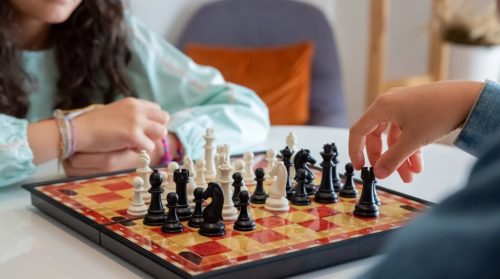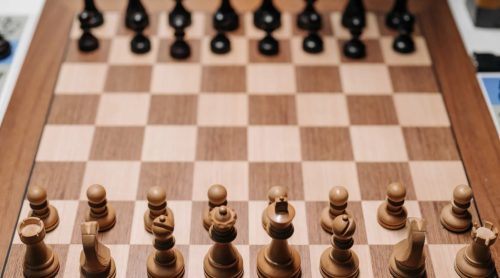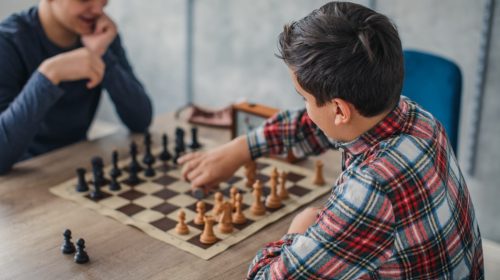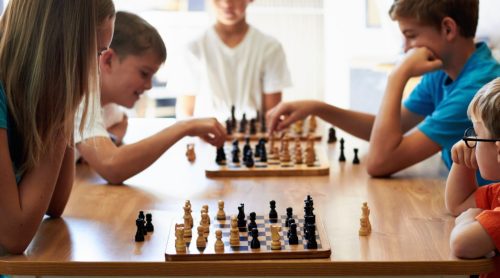Chess is a game that has fascinated and captivated people for centuries. With its strategic gameplay and complex manoeuvres, chess offers an exhilarating mental challenge that keeps players returning for more. Whether you’re a beginner or have dabbled in the game, this beginner’s guide will provide you with all the essential information on playing chess like a pro.
In this article, we will walk you through the rules of chess, from setting up the board to understanding advanced moves such as checkmate and castling. We’ll also delve into various strategies that beginners can employ to improve their gameplay and discuss different variants of chess that add exciting twists to the traditional format.
So grab your knight and join us on this journey into chess mastery. By the end of this guide, you’ll be equipped with everything you need to start playing like a seasoned grandmaster. Are you ready? Let’s dive in!
Chess Rules for Beginners

- Each player starts with 16 pieces – one king, one queen, two rooks, two knights, two bishops, and eight pawns.
- The objective is to capture the opponent’s king by strategically moving your pieces across the board.
- Remember, every piece has its unique way of moving and capturing. Pay close attention to the rules as we dive deeper into this fascinating game.
How to Play Chess?
Setting Up the Chessboard

Setting up the chessboard is the first step to playing this strategic game. Place it between both players so each has a light square on their right-hand side.
The board consists of 64 colors alternating: 32 dark and 32 light squares. Now, you’re ready for the exciting world of chess!
Basic Rules of Chess
- In chess, each player starts with 16 pieces: one king, one queen, two rooks, two knights, two bishops, and eight pawns.
- The objective is to checkmate the opponent’s king by putting it under attack that cannot be escaped.
- Each piece moves in a specific way and has unique abilities on the board. Remember always to think ahead and plan your moves strategically!
Understanding Check and Checkmate
Understanding Check and Checkmate is crucial in chess. When a king is under attack, it is in check. The player must move the king out of harm’s way, block the attacking piece, or capture it to get out of check. If a player’s king cannot escape check, it results in checkmate – game over! Mastering these concepts will help you become a formidable chess player.
Advanced Chess Rules

In addition to the basic rules, some advanced rules in chess can enhance your gameplay. These include capturing pieces and moving chess pieces strategically, promoting a pawn to a stronger piece, executing special moves like castling, and understanding check and checkmate. Mastering these rules will take your game to the next level!
Capturing Pieces and Moving Chess Pieces
Each piece has its unique way of moving across the board in chess. To capture an opponent’s piece, move it onto the square occupied by their piece. Remember, pawns can only capture diagonally! Mastering these movements is essential for strategic play. Keep practising to become a skilled chess player!
Promoting a Pawn and En Passant
Promoting a pawn is an exciting moment in chess. When your pawn reaches the opposite end of the board, it can be promoted to any other piece except a king. This allows you to enhance your attacking or defensive strategies. Another important rule is en passant, when a pawn moves two squares forward from its starting position and lands beside an opponent’s pawn, allowing you to capture it as if it had only moved one square forward. These unique rules add depth and strategy to the game of chess.
Castling and Other Special Moves
Castling is a unique move in chess that allows the king to find safety and connect with his rook. It involves moving both pieces simultaneously, which can be done either short or long. Another special move to be aware of is en passant, where a pawn captures an opponent’s pawn under specific conditions. These strategic moves add depth and complexity to the game of chess.
The Benefits of Playing Chess

- Playing chess offers numerous benefits for individuals of all ages.
- It enhances critical thinking, problem-solving, and decision-making skills and improves concentration and focus.
- Chess can boost creativity, memory retention, and analytical reasoning abilities. Moreover, it provides a platform for social interaction and fosters sportsmanship and resilience in players.
Chess Strategies for Beginners
When starting in chess, it’s important to have a strategy. One common strategy is controlling the centre of the board by developing your pieces and creating threats. Another strategy is planning and thinking about possible moves and counter-moves. Don’t forget to protect your pieces and look for opportunities to attack your opponent’s weaknesses. Practice these strategies, analyze your games, and constantly improve your skills!
Chess Variants and Tournament Rules

Many exciting chess variants add new dimensions and challenges to the game. Some popular ones include Blitz Chess, where players have limited time to make their moves, and Fischer Random Chess, which randomizes the initial position of the pieces. In tournament play, strict rules govern things like time controls and player conduct to ensure fair competition. Stay tuned for more on these fascinating variations!
Improving Your Chess Skills
To become a better chess player, practice is crucial. Play regularly against opponents of varying skill levels to challenge yourself. Study different strategies and tactics by reading books or watching instructional videos. Analyze your games to identify areas for improvement. Join local chess clubs or online communities to play against other enthusiasts and learn from their experiences. With dedication and effort, you can continuously enhance your chess skills over time.
Conclusion
In conclusion, learning how to play chess is like embarking on a thrilling adventure where each move counts. Just like in life, understanding the rules and strategies helps you make better decisions. Chess is not just a game; it’s a journey of skill, tactics, and patience.
As a beginner, focus on the basics – how each piece moves and the game’s objective. Gradually, you’ll find joy in the intricacies of planning and outsmarting your opponent. Don’t be afraid to make mistakes; they are part of the learning process.
Remember, chess is not just about winning or losing; it’s about the joy of playing and improving. So, set up the board, move your pieces, and enjoy the timeless chess game. May every move bring you closer to becoming a strategic master!

